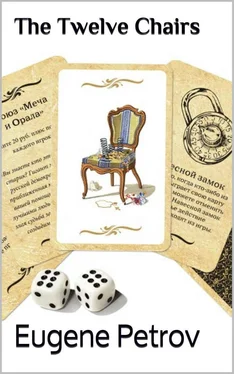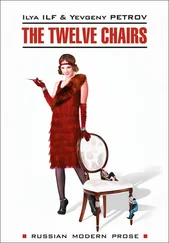Eugene Petrov - The Twelve Chairs
Здесь есть возможность читать онлайн «Eugene Petrov - The Twelve Chairs» весь текст электронной книги совершенно бесплатно (целиком полную версию без сокращений). В некоторых случаях можно слушать аудио, скачать через торрент в формате fb2 и присутствует краткое содержание. Год выпуска: 2013, Жанр: Юмористическая проза, на английском языке. Описание произведения, (предисловие) а так же отзывы посетителей доступны на портале библиотеки ЛибКат.
- Название:The Twelve Chairs
- Автор:
- Жанр:
- Год:2013
- ISBN:нет данных
- Рейтинг книги:5 / 5. Голосов: 1
-
Избранное:Добавить в избранное
- Отзывы:
-
Ваша оценка:
- 100
- 1
- 2
- 3
- 4
- 5
The Twelve Chairs: краткое содержание, описание и аннотация
Предлагаем к чтению аннотацию, описание, краткое содержание или предисловие (зависит от того, что написал сам автор книги «The Twelve Chairs»). Если вы не нашли необходимую информацию о книге — напишите в комментариях, мы постараемся отыскать её.
Find traces of a separate headset difficult and heroes face different adventures and troubles.
The Twelve Chairs — читать онлайн бесплатно полную книгу (весь текст) целиком
Ниже представлен текст книги, разбитый по страницам. Система сохранения места последней прочитанной страницы, позволяет с удобством читать онлайн бесплатно книгу «The Twelve Chairs», без необходимости каждый раз заново искать на чём Вы остановились. Поставьте закладку, и сможете в любой момент перейти на страницу, на которой закончили чтение.
Интервал:
Закладка:
by the lifeguard rescue service. This was clear, furthermore, from the
slogan on the wall:
ASSISTANCE TO DROWNING PERSONS IS
IN THE HANDS OF THOSE PERSONS THEMSELVES
Ostap bowed, stretched out his hands as though restraining the public
from undeserved applause, and went up on to the dais.
"Comrades and brother chess players," he said in a fine speaking voice:
"the subject of my lecture today is one on which I spoke, not without
certain success, I may add, in Nizhni-Novgorod a week ago. The subject of my
lecture is 'A Fruitful Opening Idea'.
"What, Comrades, is an opening? And what, Comrades, is an idea? An
opening, Comrades, is quasi una fantasia. And what, Comrades, is an idea? An
idea, Comrades, is a human thought moulded in logical chess form. Even with
insignificant forces you can master the whole of the chessboard. It all
depends on each separate individual. Take, for example, the fair-haired
young man sitting in the third row. Let's assume he plays well. . . ." The
fair-haired young man turned red.
"And let's suppose that the brown-haired fellow over there doesn't play
very well."
Everyone turned around and looked at the brown-haired fellow.
"What do we see, Comrades? We see that the fair-haired fellow plays
well and that the other one plays badly. And no amount of lecturing can
change this correlation of forces unless each separate individual keeps
practising his dra-I mean chess. And now, Comrades, I would like to tell you
some instructive stories about our esteemed ultramodernists, Capablanca,
Lasker and Dr Grigoryev."
Ostap told the audience a few antiquated anecdotes, gleaned in
childhood from the Blue Magazine, and this completed the first half of the
evening.
The brevity of the lecture caused certain surprise. The one-eyed man
was keeping his single peeper firmly fixed on the Grossmeister.
The beginning of the simultaneous chess match, however, allayed the
one-eyed chess player's growing suspicions. Together with the rest, he set
up the tables along three sides of the room. Thirty enthusiasts in all took
their places to play the Grossmeister. Many of them were in complete
confusion and kept glancing at books on chess to refresh their knowledge of
complicated variations, with the help of which they hoped not to have to
resign before the twenty-second move, at least.
Ostap ran his eyes along the line of black chessmen surrounding him on
three sides, looked at the door, and then began the game. He went up to the
one-eyed man, who was sitting at the first board, and moved the king's pawn
forward two squares.
One-eye immediately seized hold of his ears and began thinking hard.
A whisper passed along the line of players. "The Grossmeister has
played pawn to king four."
Ostap did not pamper his opponents with a variety of openings. On the
remaining twenty-nine boards he made the same move-pawn to king four. One
after another the enthusiasts seized their heads and launched into feverish
discussions. Those who were not playing followed the Grossmeister with their
eyes. The only amateur photographer in the town was about to clamber on to a
chair and light his magnesium flare when Ostap waved his arms angrily and,
breaking off his drift along the boards, shouted loudly:
"Remove the photographer! He is disturbing my chess thought!"
What would be the point of leaving a photograph of myself in this
miserable town, thought Ostap to himself. I don't much like having dealings
with the militia.
Indignant hissing from the enthusiasts forced the photographer to
abandon his attempt. In fact, their annoyance was so great that he was
actually put outside the, door.
At the third move it became clear that in eighteen games the
Grossmeister was playing a Spanish gambit. In the other twelve the blacks
played the old-fashioned, though fairly reliable, Philidor defence. If Ostap
had known he was using such cunning gambits and countering such tested
defences, he would have been most surprised. The truth of the matter was
that he was playing chess for the second time in his life.
At first the enthusiasts, and first and foremost one-eye, were
terrified at the Grossmeister's obvious craftiness.
With singular ease, and no doubt scoffing to himself at the
backwardness of the Vasyuki enthusiasts, the Grossmeister sacrificed pawns
and other pieces left and right. He even sacrificed his queen to the
brown-haired fellow whose skill had been so belittled during the lecture.
The man was horrified and about to resign; it was only by a terrific effort
of will that he was able to continue.
The storm broke about five minutes later. "Mate!" babbled the
brown-haired fellow, terrified out of his wits. "You're checkmate, Comrade
Grossmeister!'
Ostap analysed the situation, shamefully called a rook a "castle" and
pompously congratulated the fellow on his win. A hum broke out among the
enthusiasts.
Time to push off, thought Ostap, serenely wandering up and down the
rows of tables and casually moving pieces about.
"You've moved the knight wrong, Comrade Grossmeister," said one-eye,
cringing. "A knight doesn't go like that."
"So sorry," said the Grossmeister, "I'm rather tired after the
lecture."
During the next ten minutes the Grossmeister lost a further ten games.
Cries of surprise echoed through the Cardboardworker club-room.
Conflict was near. Ostap lost fifteen games in succession, and then another
three.
Only one-eye was left. At the beginning of the game he had made a large
number of mistakes from nervousness and was only now bringing the game to a
victorious conclusion. Unnoticed by those around, Ostap removed the black
rook from the board and hid it in his pocket.
A crowd of people pressed tightly around the players.
"I had a rook on this square a moment ago," cried one-eye, looking
round, "and now it's gone!"
"If it's not there now, it wasn't there at all," said Ostap, rather
rudely.
"Of course it was. I remember it distinctly!"
"Of course it wasn't!"
"Where's it gone, then? Did you take it?"
"Yes, I took it."
"At which move?"
"Don't try to confuse me with your rook. If you want to resign, say
so!"
"Wait a moment, Comrades, I have all the moves written down."
"Written down my foot!"
"This is disgraceful!" yelled one-eye. "Give me back the rook!"
"Come on, resign, and stop this fooling about."
"Give me back my rook!"
At this point the Grossmeister, realizing that procrastination was the
thief of time, seized a handful of chessmen and threw them in his one-eyed
opponent's face.
"Comrades!" shrieked one-eye. "Look, everyone, he's hitting an
amateur!"
The chess players of Vasyuki were aghast.
Without wasting valuable time, Ostap hurled a chessboard at the lamp
and, hitting out at jaws and faces in the ensuing darkness, ran out into the
street. The Vasyuki chess enthusiasts, falling over each other, tore after
him.
It was a moonlit evening. Ostap bounded along the silvery street as
lightly as an angel repelled from the sinful earth. On account of the
interrupted transformation of Vasyuki into the centre of the world, it was
not between palaces that Ostap had to run, but wooden houses with outside
shutters.
The chess enthusiasts raced along behind.
"Catch the Grossmeister!" howled one-eye.
"Twister!" added the others.
"Jerks!" snapped back the Grossmeister, increasing his speed.
Читать дальшеИнтервал:
Закладка:
Похожие книги на «The Twelve Chairs»
Представляем Вашему вниманию похожие книги на «The Twelve Chairs» списком для выбора. Мы отобрали схожую по названию и смыслу литературу в надежде предоставить читателям больше вариантов отыскать новые, интересные, ещё непрочитанные произведения.
Обсуждение, отзывы о книге «The Twelve Chairs» и просто собственные мнения читателей. Оставьте ваши комментарии, напишите, что Вы думаете о произведении, его смысле или главных героях. Укажите что конкретно понравилось, а что нет, и почему Вы так считаете.












